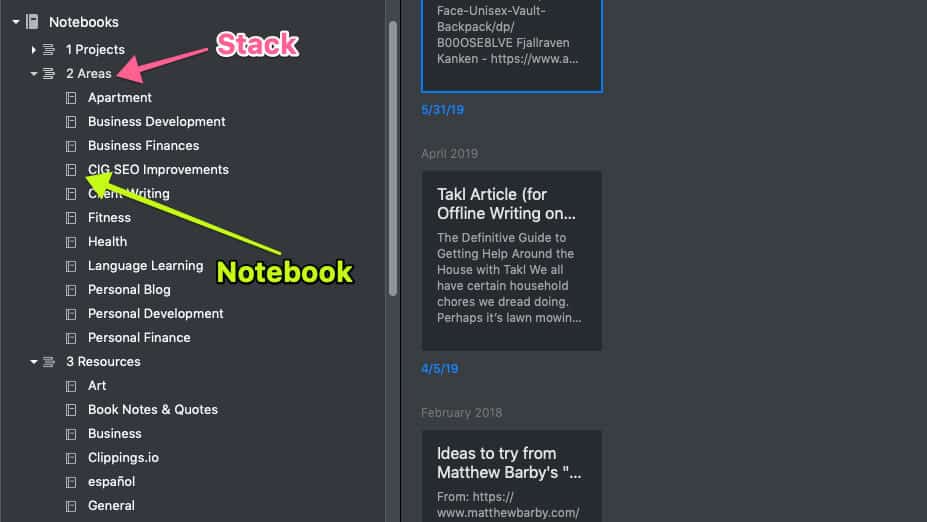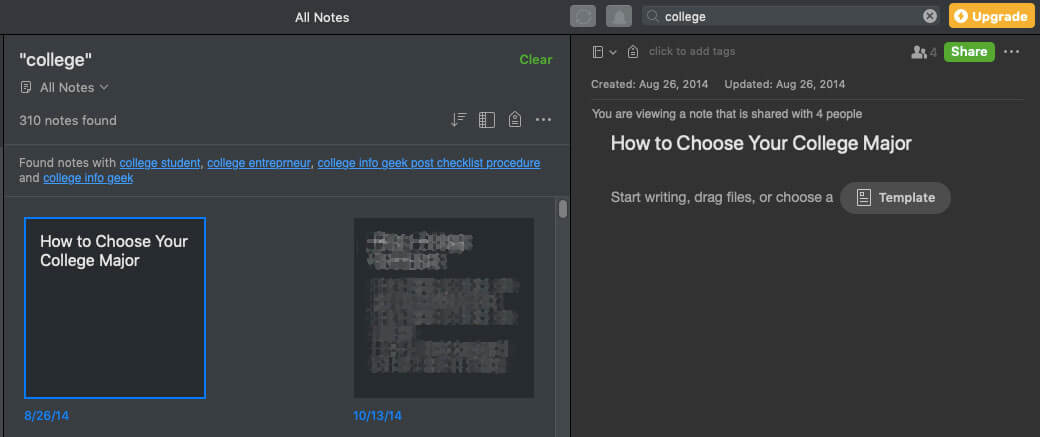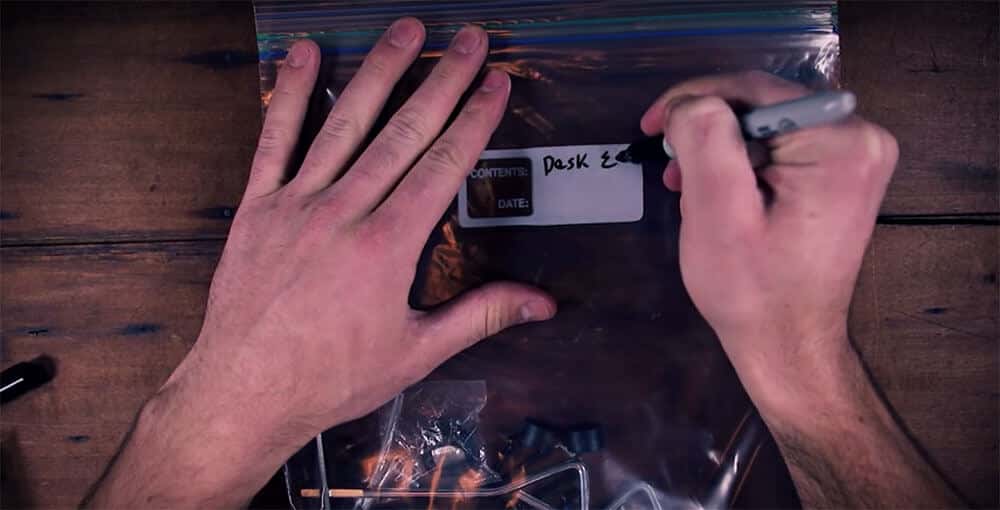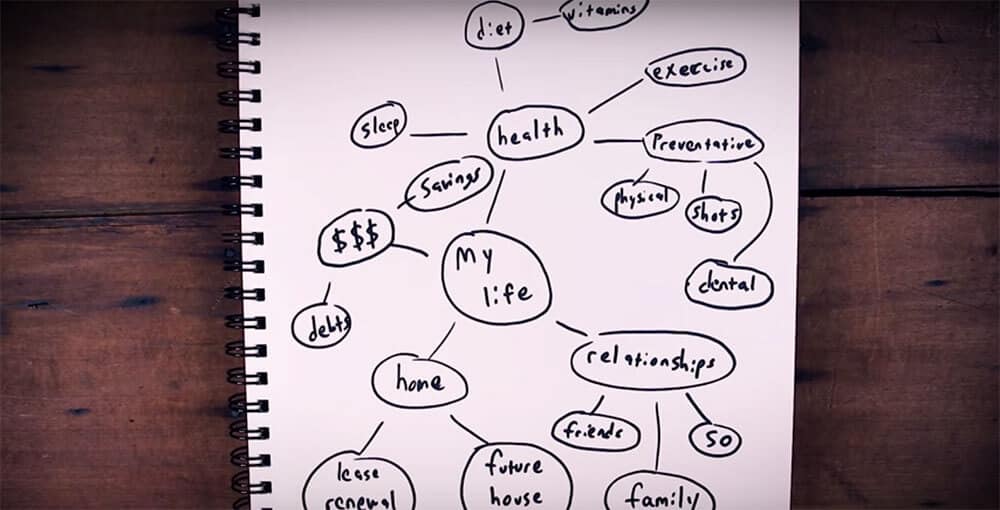It’s easy to assume that some people are born organized, while others are disorganized.
And sure, while some people may be naturally more organized than others, that doesn’t mean you’re destined to be disorganized. You can become an organized person with practice and intention.
But what makes an organized person?
There are many things, but we think there are nine that are especially important. If you start doing the nine things on this list (or even a few of them), you’ll be on your way to becoming an organized person.
Don’t Rely Solely On Your Brain to Store Information
Your brain is an amazing organism, capable of processes that have allowed humans to dominate the planet. But as amazing as your brain is at assessing information, making decisions, and generally keeping you alive, it’s not so great at storing information.
While it is possible to commit massive sums of information to memory, this requires a lot of effort. For everyday obligations, tasks, and information you need to remember, it’s better to use an external system.
A good start is just writing down a list of things you need to do. But this system is still inadequate, as you could possibly lose the list or forget it.
Organized people don’t just store information externally; they use a system they can trust.
What are the signs of a system you can trust? Here are a few:
The system won’t lose your data
This rules out your brain (since memory is fallible) and physical documents that aren’t backed up somewhere else (since you could lose them, forget them, or even accidentally destroy them).
Examples of systems that won’t lose your data are Evernote, Notion, Google Drive, and Todoist. All of these systems have backups and redundancies that will preserve your data even if your computer crashes or a server fails.
The system is easily accessible
You need to be able to access important information no matter where you are. The best way to do this is to use a cloud-based system. This way, you can access your data even if you’re at a different computer or in a different place.
Evernote, Google Drive, Todoist, and Notion are all cloud-based systems to consider.
The system is well-organized and easily searchable
A quality system for storing information is well-organized and easily searchable. This way, you can quickly retrieve data when you need it.
For instance, Evernote lets you organize information into notebooks, which you can then organize into larger “Stacks.” This hierarchical system ensures that you can navigate to a note in a logical way.

Evernote is also searchable, letting you find information based on keywords.

Always Label Things
That container of leftovers has been sitting in the fridge for…well, how long has it been now? 2 days? 2 weeks? If only you’d labeled it with the date you made it, you could eat it without fear of E. coli (or throw it away without fear of wasting it).
This everyday example illustrates the importance of labeling things. Organized people always label things, especially if they aren’t going to use or interact with those things immediately. This way, they don’t have to rely on (fallible) memory to know what a thing is days, weeks, months, or even years later.

Here are some things you should always label:
- Containers of perishable food
- Bags, boxes, or other containers of supplies
- Hanging folder organizers
- Documents (with the date you last updated them)
- Your sleeves of Magic: The Gathering cards
Your future self will thank you for taking a bit of time to label things (especially when you’re moving).
Be Mindful
Here’s the key difference between organized and disorganized people:
- Disorganized people let life catch them off guard.
- Organized people are constantly looking ahead and anticipating things before they become urgent.
A few examples:
- The disorganized person rushes to appointments at the last minute. The organized person reviews their calendar each day to anticipate appointments and meetings.
- The disorganized person writes a paper at 2 am the night before it’s due. The organized person started working on their paper a week before it was due.
- The disorganized person waits till they’re out of clean clothes before they do laundry. The organized person does laundry on a regular schedule.
Of course, mindfulness isn’t something that you can develop immediately. You have to practice it and make it a habit.
To start developing a mindfulness habit, make a list of all the obligations and dependencies in your life. If it helps, you can draw it out as web:

Often, simply making a list of all the things going on in your life is enough to help you keep better track of them.
Build in a Time Buffer
You have a dentist appointment at 9 AM. It takes 20 minutes to drive to your dentist’s office. What time should you leave home?
It’s tempting to answer “8:40 AM,” but that’s awfully optimistic. This answer assumes that nothing will happen during your trip to slow you down. It assumes that:
- There won’t be traffic, road closures, or other driving issues.
- You won’t forget something before heading out the door.
- You’ll somehow be able to check in for your appointment at the same time it starts.
If you were being organized, you’d build in a time buffer. That is, you’d allow extra time to get to your appointment because you assume that something could slow you down.
How do you decide how much of a time buffer you need? This depends on what you’re doing, and it’s something you’ll learn with experience. But here’s how you could go about deciding, using the dentist appointment example:
- It normally takes me 20 minutes to drive to the dentist, but I’ll allow an extra 5 minutes for traffic.
- I should also allow an extra 5 minutes to check in for my appointment.
- But I also know that it can take time to find parking where I’m going, so I should allow an extra 5 minutes for that.
Since you need to allow an extra 15 minutes for all of the above, you now decide to leave for your appointment at 8:25 AM.
But what if you end up arriving at 8:45 because you didn’t need the extra time? Did you just waste 15 minutes?
No, of course not. After all, you did bring a book or something else to do in your spare moments, right? Then you just got some extra time to read and improve yourself.
When you build in extra time to do things, you accept that life is unpredictable. You also end up keeping your appointments, completing tasks on time, and generally being less stressed.
Create Redundancies
Organized people live by the motto, Two is one, one is none. That is, organized people have backups of anything they regularly use.
Your work can get seriously derailed if you run out of or break your essential supplies.
For instance, what if you’re taking a math exam and then run out of lead for your pencil? If you have extra lead, you can keep going without a pause. But if you don’t have any extra, then it could completely derail your progress on the exam, hurting your final grade.
What you should keep extras of depends on two things:
- The work you do
- The lifestyle you live
For instance, I need to have a charged laptop to do my work. And I also travel frequently, increasing the odds that I’ll lose things like my charger. Therefore, I always travel with a back-up laptop charger (and keep a dedicated one just for use at home).
You have to decide for yourself what you should keep extras of, but just remember that more redundancy tends to be better (within reason).
Organize Things Based on What Works for You (Not Other People)
When you start to learn about organization and productivity, you’ll come across people who insist you use a particular tool or system. For instance:
- You have to use a Moleskine notebook. They’re the best.
- Your files have to be in alphabetical order for maximum ease of navigation.
- Evernote is the superior note-taking software; all other systems are crap.
While all of the above are very legitimate systems and tools to use, that doesn’t mean they’re the best. There’s no such thing as the “best” tool or system. There’s only what works best for you.
Whenever someone gives you organization advice, don’t follow it blindly. Test it, and see if it suits you. If it does, keep it; if it doesn’t, discard it.
I used to use Asana for managing my tasks, because that’s what everyone I worked with used.
But I ultimately found it too complex for personal task management, so I switched to Todoist. I have some friends who swear by Asana and can’t imagine using another system. But it didn’t work for my needs, so I switched.
You should do the same: evaluate tools and systems with an open mind, but ditch them if they don’t work for you.
Respect the Value of Mise En Place
In the culinary world, mise en place is a way of life. It literally translates as “everything in place,” and it describes the way you should set up your work environment.
If you set up things in a clean, organized way, you’ll be able to cook more efficiently. This is key in professional kitchens, where a disorganized work area is a recipe for disaster. When things are disorganized, there’s a risk of wasted time, wasted ingredients, or even injury.
The stakes may not be so high in your work, but you can still apply the mise en place mindset. To work with maximum efficiency and minimum interruption, set up your work environment before you begin.
For instance, here’s what your mise en place might look like for writing a paper:
- Be sure your computer is plugged in.
- Have water to keep you hydrated.
- Have any books or notes you need for reference.
- Close all files and programs that you don’t need for your current task.
- Disable any notifications that could distract you.
Mise en place also includes putting things back the way they were once you’re done working. For instance:
- Washing dishes (or at least putting them in the dishwasher) after you use them.
- Putting away ingredients when you’re done cooking.
- Putting your books away after studying.
- Making your bed each morning.
- Putting laundry away after you wash it.
If you make mise en place a habit, you’ll spend more time on the things that matter, and less time looking for what you need.
Be Deliberate About the Things You Own
The more things you own, the more energy you have to spend maintaining and organizing them. Therefore, a big part of being organized is to be mindful of the things you buy, as well as the things you keep.
When you’re buying something, ask if it brings you value. “Value” can mean that the thing is useful, but it can also mean the thing brings you joy. Often, the two go together.
For instance, buying a new kitchen knife was absolutely worth it. The new knife has made it easier for me to cook, which has the utility of saving me money and helping me eat healthier. But it also brings me joy, since a better knife makes the actual process of cooking less frustrating.
Whatever you do, don’t buy something for frivolous or stupid reasons. For instance, don’t get a new coat just to impress people; buy one when your current coat is worn out and no longer functions.
Along with being careful about what you buy, you can also stay organized by evaluating if the things you have are worth keeping. Again, ask if the item has utility or brings you joy. If it doesn’t then get rid of it.
Keeping things you don’t need just creates more clutter for you to organize.
To keep the things you own under control, I recommend setting a reminder for every year or every quarter to go through what you own and decide if there’s anything you can donate, recycle, or (as a last resort) throw away.
Be Deliberate About Your Commitments
In addition to keeping the physical things in your life under control, you should be careful about what you commit to. Just as having fewer possessions makes it easier to organize your physical space, having fewer commitments makes it easier to organize your mind and your time.
Only do things that bring you joy or that are important to your life. Don’t do something just because you think you “should” or out of unexamined habit.
It’s natural to want to “maximize your time” by doing as many things as possible. But when you commit to fewer things, you’ll actually accomplish more. This is because having fewer commitments lets you focus more energy on the things that matter.
For instance, I way overcommitted myself during my freshman year of college. I was in five music ensembles, was taking saxophone lessons, and was in several clubs. Plus, I was taking a full course load and figuring out how college worked.
The results, unsurprisingly, were stress and burnout. Plus, I wasn’t able to give my full attention to the groups I was part of, and my performance suffered.
So after my first year of college, I cut back to only the three ensembles and the one club I most enjoyed. I had more free time, my stress decreased, and I could focus more on all the interesting classes I was taking. I also had time to build a website and start a blog, which led to my gig writing for College Info Geek.
To keep your commitments in check, I recommend a quarterly or yearly review. If you’re in college, you can also review things each semester. Just be sure to make it a regular practice.
Organization Is a Practice, Not a Personality
As you can now see, being organized is all about the way you act. You can develop the habits of an organized person with time, even if you’re “naturally” disorganized.
For more tips on how to be an organized person, check out these resources:
- How to Easily Stay Organized and Productive in College
- The Best Way to Organize Your Files and Folders
- How I Use My Calendar Efficiently
Image Credits: featured

